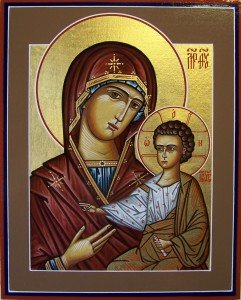 In the last issue, I shared some thoughts about the acts of the Council of Ephesus (431) and shared the fact that our veneration of Mary, as the Mother of God, is directly connected to our understanding of the Incarnation of Our God. It is important to note that we DO NOT worship Mary but, rather, venerate her. Worship is only reserved for God.
In the last issue, I shared some thoughts about the acts of the Council of Ephesus (431) and shared the fact that our veneration of Mary, as the Mother of God, is directly connected to our understanding of the Incarnation of Our God. It is important to note that we DO NOT worship Mary but, rather, venerate her. Worship is only reserved for God.
It is important to note, however, that the piety and theology of the early church never tended to separate the veneration of Mary, the Mother of God, from its Christological context. There was no doctrinal definition of her position except that of her divine motherhood. Her exaltation, after Ephesus, did not mean that her belonging to limited humanity was forgotten. Well-know passages by John Chrysostom, by far the most popular and authoritative father of the Greek Church, continued to be read and copied. Commenting on such passages as Matthew 12:46-49 (Who is my mother and who are my brothers), or John 2:4 (Woman, how does this concern of yours involve me?), Chrysostom frankly recognized Mary’s human failings and imperfections. The mother of Jesus was therefore seen, within the mystery of salvation, as the representative of humanity in need of salvation. But, within humankind, she was the closest to the Savior and the worthiest receptacle of the new life.
In the medieval West and not the East, the Augustinian understanding of original sin as inherited guilt, made it inevitable that Mary be approached in terms of an immaculate conception, as the object of a special grace of God that made her in advance worthy of divine motherhood. The East did not follow that trend, because the consequences of the sin of Adam were seen as inherited mortality rather than as guilt, so that there was no need to see Mary in isolation from the common lot of limited humanity. However, there developed in the East the tradition her glorification after death. Anticipating the general resurrection, her Son made her, as His mother, inseparable from his own risen body, above the angelic powers themselves.
We must remember that the early church made every effort to make clear distinctions with regard to the matters of faith. In later years there has not been the same intense discipline when dealing to such matters. Words and expressions have a real implication when we talk about faith. The East always struggled over words and phrase to express the faith.
